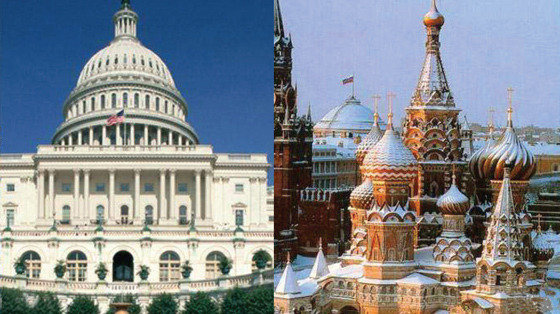What to Americans is a private folly, to Russians is US policy, it seems

by Lev Tsitrin
One often hears that the American Right sides with Putin on certain cultural issues, and sees him as a flag-barer of the conservative values that are under attack in America. Somehow, this is interpreted as a sign of support for Putin’s methods of governance. Yet, those are two very different things, the difference being inherent to the political mentality of the two countries.
Americans and Russians, it seems to me, perceive the role of the government very differently. In Russia, the government is a shepherd guiding the public in the right direction; the government knows what’s good and true and the public must follow. Americans have the opposite perception — the government is the product of the public mood, rather than its creator. Elections are designed to capture the mood of the country at set intervals — and every two years, via the congressional or presidential elections, the country has a chance to change its political direction.
The methods of governance are correspondingly different, too. America is governed by “forbidding,” while the Soviet Union (the country with which I am well familiar, having been born and raised there — and, by extension, Russia, I suspect) controls its public by “allowing” — and those two modes of where and how the government’s yoke is placed are deeply ingrained in respective cultures. Americans are free to utilize the opportunity that is not forbidden by law (and are aware that the Bill of Rights forbids the government from passing certain kind of laws, like those limiting the exercise of religion or of speech.) Russians, on the other hand, are supposed to do only what is expressly permitted — and their constitution sets no limits on the kind of laws Russian government can pass. Hence, it is possible in Russia to pass laws that forbid calling the war a war — a kind of law that the US Constitution precludes. (As to the exercise of religion, the tragicomic story of a Russian ex-policeman who organized a religious community in Siberia that seemed to be a harmless cult promoting rejection of civilization by homesteading, self-sufficiency and vegetarianism, and who got arrested for no apparent reason other than starting an unsanctioned religion paints the picture of the opportunities for spiritual life in Russia).
Accordingly, what goes on in America is seen very differently by Americans and by Russians. For instance, Americans look at certain manifestations of the so-called progressive politics — like transgenderism — and organize to support or to combat them. Its American opponents see the fact that people engage in “gender change” not as a manifestation of government policy, but as a personal folly that leads to irreparable self-harm and therefore has to be forbidden by law, and are trying to get the like-minded people elected to get it blocked. The Russians, apparently, view it very differently. They unconsciously judge what they see going on in “progressive” America by the rules of the Russian political culture, and are not only appalled (as many Americans are) but — unlike the Americans — see it as government-sponsored, as a deliberate conspiracy to corrupt the public. Hence, the lesson the Russians draw is not that in America — as anywhere else in the world — some people act as fools, but that American government is demonic, seeking to corrupt the world with immorality and perversion — and that Holy Russia must be a bulwark of resistance, and should act proactively against the threats to its moral fiber, like by invading the West-leaning Ukraine to prevent such evil from seeping into Russia, and undermining it from within.
In the Russian system of top-down governance any unsanctioned, private initiative is perceived as competition with the government for shepherding the society and is therefore subversive by nature, and needs to be suppressed. Even worse, the Russians apparently do not see how governance can be done any other way. They think that in the final analysis every country is governed in that same top-down manner — in democracies too, through behind-the-scenes conspiratorial machinations, those with the real power pulling the government’s strings. But such logic, Russia is governed in a much more honest, straightforward and transparent way — no one pulls Putin by the strings, while America, hiding behind its democratic facade, is ruled by secret, demonic cabal of ultimate decision-makers who pull the strings in the Congress and the White House. Putin is no one’s puppet, the reasoning goes, but Biden is.
And so, looking at the results of the bottom-up governance in America, the Russians — who deny the very possibility of bottom-up governance, see conspiracies where Americans see private follies. This, I think, is the major cause of confrontation between Russia and the West. Russia sees the West as just as cynical and as corrupt as Russia is — but much more hypocritical, preaching freedom and democracy without practicing it — since practicing it is, in practice, impossible: someone just has to pull the strings; democracy is just a convenient cover-up myth.
How to resolve this clash of cultural perceptions? I do not know. Conspiratorial thinking is not entirely rational, I suspect. Since perestroika Russians had the ability to travel abroad, and to imbibe enough of the knowledge of the West to be immune to such thinking. Apparently, not a few did — to judge by the thousands of Russians who fled Russia after it invaded Ukraine — and yet the bulk of population sticks to that conspiratorial thinking, either because they genuinely believe it, or out of fear of being seen as opposing the government. Whether that mentality can be broken, only time — and the outcome of the war in Ukraine — will tell. But as to the American Right and its culture wars — they are done the bottom-up way, through the ballot box. We’ll learn in November which way the country is headed.